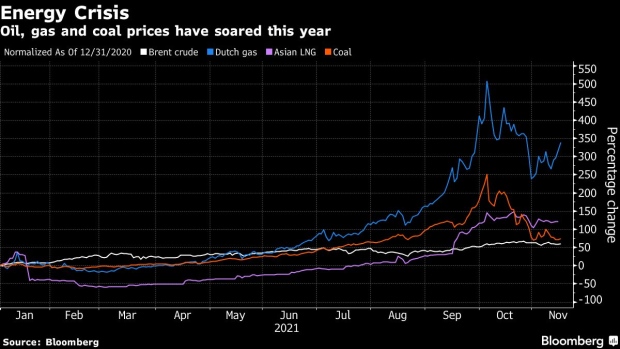Nov 16, 2021
India Advises Against Sales of Oil Reserves: Adipec Update
, Bloomberg News

(Bloomberg) -- India said it’s made a “concerted push” with OPEC+ on oil production, but advised major consumers against selling their strategic reserves.
The country’s petroleum minister, Hardeep Singh Puri, spoke Tuesday with Bloomberg at the Adipec conference in Abu Dhabi. The comments come as U.S. politicians put pressure on President Joe Biden to bring down gasoline prices, possibly by banning crude exports and releasing oil from the government’s Strategic Petroleum Reserve.
The world’s biggest oil and gas companies and many OPEC+ energy ministers are in Abu Dhabi this week for Adipec. It’s one of the first major in-person events for the industry since the start of the coronavirus pandemic.
The conference, running from Nov. 15-18, is taking place in the wake of the COP26 climate talks and with energy prices soaring. Brent crude has climbed almost 60% this year to above $80 a barrel, while natural-gas prices in Asia and Europe hit record highs recently.
Key developments:
- Highlights from the first day
- Saudis, Russia Signal OPEC+ Will Resist Calls For More Oil
- Italy’s Eni Says Oil Prices Could Reach $100, But Not for Long
- Russia’s Gas Policy Toward Europe is ‘Abusive’, Ukraine Says
(Timestamps UAE.)
Mitsui, GS Energy Join Abu Dhabi’s Blue Hydrogen Project (11:45 a.m.)
Japan’s Mitsui and South Korea’s GS Energy will partner with Adnoc and Fertiglobe to develop blue ammonia at the Ta’ziz industrial zone in Ruwais, Abu Dhabi.
Mitsui and GS Energy will take “significant volumes” of blue ammonia to “meet growing demand in the energy and industrial sectors in Japan and Korea,” Adnoc said.
Major state energy firms in the Persian Gulf, including Adnoc and Saudi Aramco, are in talks with companies in Asia about long-term supply contracts for blue hydrogen. The fuel is made by converting natural gas and capturing the carbon emissions. It’s usually shipped as ammonia to make it more stable.
Hydrogen is seen as crucial to the shift away from oil, coal and gas as it’s a much cleaner fuel. But it’s expensive to make and the global market is tiny today. It could be worth $700 billion annually by 2050, according to BloombergNEF.
Nigeria Says It Can Raise Oil Output, Even If OPEC Will Struggle (10:30 a.m.)
Nigeria will be able to raise its crude oil production from around 1.45 million barrels a day to 1.7 million or 1.8 million by the end of the year, Mele Kyari, head of the Nigerian National Petroleum Corp., said to Bloomberg Television.
Including condensate -- a light form of oil -- Nigeria’s output can reach 2 million barrels daily by then, he said.
Still, OPEC members as a whole will struggle to hit their full quotas any time soon, he said.
“I’m not sure it’ll be possible to fill the gap” quickly, partly due to a lack of financing for investment in oil fields, he said.
Crude’s likely to stay above $80 a barrel for “a while to come” and $100 is “within sight,” he said.
Any sell-down of the U.S. Strategic Petroleum Reserve will probably have a small impact on prices “because demand’s above pre-Covid levels and supply’s not matching that.”
India Says It’s Made ‘Concerted Push’ With OPEC+ (10:10 a.m.)
“I have spoken to my counterparts from Saudi Arabia, the UAE, Russia” and made a “concerted push” on oil production, India’s Energy Minister Hardeep Singh Puri said in an interview with Bloomberg Television.
He doubts that a co-ordinated sale of strategic petroleum reserves by major consumers would help.
Strategic oil reserves weren’t “ever intended for a situation like this,” he said. “It’s for force majeure situation, if there’s an earthquake, a global outbreak of hostilities, and oil supplies are shut up.”
Schlumberger Among Firms Winning $6 Billion of Adnoc Contracts (10:10 a.m.)
Abu Dhabi National Oil Co., known as Adnoc, will invest almost $6 billion in drilling projects to boost its crude-oil production capacity to 5 million barrels per day by 2030.
Schlumberger, Weatherford, Baker Hughes are among the companies that have won contracts. For more detail, click here.
©2021 Bloomberg L.P.


